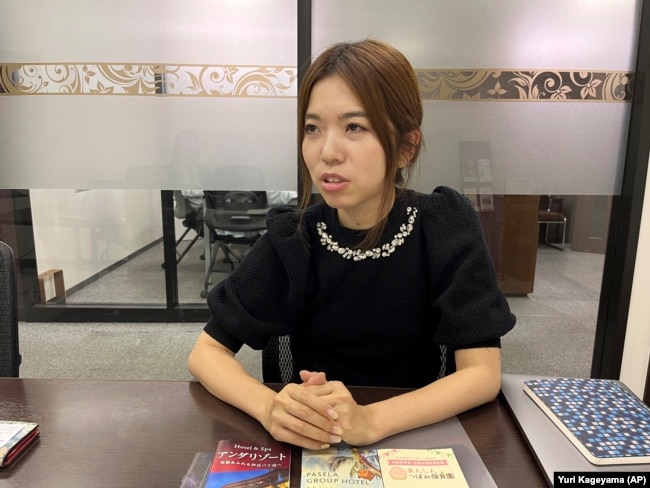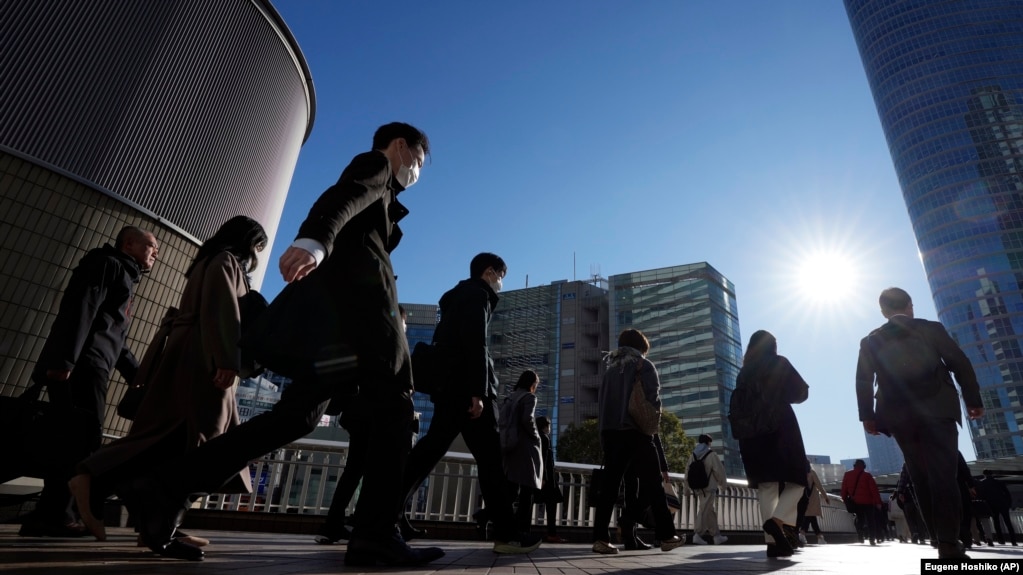”the Japanese language has a term for working oneself to death. ”のっけから、笑いすぎる言葉から始まって・・・よくご存じで、と言いたくなります。
Jill RobbinsさんAnd Mario Ritter, Jr.さんすご〜い!!と思ったら、最後にYuri Kageyama さんのレポートとあり、然もありなんと腑に落ちた次第です。
しかしながら笑ってもいられませんよね。このVOAニュースは英語学習者向けのコンテンツです、ということはnativeの人以外の人が聞くわけです。
怖いですよね、こんな日本!!私なら旅行先には選びません。気の毒すぎて、日本を楽しめませんもの、労働の搾取が日常的に行われているわけですから。
Japan Considers Four-day Work Weeks
Japan is a nation so hardworking that the Japanese language has a term for working oneself to death. Now, the government is trying to deal with a labor shortage.
One solution is to get more people and companies to accept four-day workweeks. The Japanese government first supported a shorter working week in 2021. Few companies have signed on, however. The Ministry of Health, Labor and Welfare said only about eight percent of companies permit three days off a week, while seven percent give their workers the required one day off.
Hoping to get small and medium-sized businesses to change, the government started a "work style reform" campaign. It pushes shorter hours and other flexible plans for work along with paid time off and limits on overtime. The labor ministry recently started offering free services and resources to help companies make the change.
'Innovating how we work'
A ministry website explains the "hatarakikata kaikaku" campaign, which means "innovating how we work." It says that when workers can choose how they work, they will have a better outlook on the future and the economy will grow.
The department handling the new support services for businesses says only about three companies have asked for their advice.
Such changes will not come easily in the Japanese culture, where being a “workaholic,” or frequently working overtime, has long been highly valued. That is credited for the country’s national recovery and fast economic growth after World War II.
There is great pressure to be the same as the others in one’s work group. People usually take vacations at the same time of year as their co-workers. Although the law and labor agreements limit overtime, some work longer hours without pay.
Death from overwork
A recent government report dealt with "karoshi." That is the Japanese term meaning "death from overwork.” The report said Japan has at least 54 such deaths a year, including from heart attacks.
Tim Craig wrote a book called Cool Japan: Case Studies from Japan's Cultural and Creative Industries.
"Work is a big deal here. It's not just a way to make money, although it is that, too," said Craig.
Some officials think it is time to change that way of thinking to save the workforce. Japan's birth rate continues to fall, and the work culture is said to be one reason for that. Government reports expect that, at the current rate, the working age population will drop by 40 percent to 45 million by 2065.
Supporters of the three-days-off model say it helps people remain in the workforce longer. It would give them more time to raise children and care for older relatives. For retirees living on retirement pensions, it would provide additional income.
More time for family
Akiko Yokohama works at Spelldata, a technology company that lets employees work a four-day work week. She takes Wednesdays off along with Saturdays and Sundays. The extra day off allows her to get her hair done, go to other appointments or go shopping.
Her husband works in real estate. He also gets Wednesdays off but works weekends, which is common in his industry. Yokohama said that it lets her and her husband go on midweek family outings with their elementary-school age child.
But there are signs of change. A few companies, including Uniqlo, Ricoh and Hitachi have begun offering a four-day workweek.
A recent Gallup public opinion study measured employee engagement. Gallup said Japan has among the least engaged workers of all nationalities it has studied. Only six percent of the Japanese who answered described themselves as engaged at work compared to the worldwide average of 23 percent.
That means relatively few Japanese workers felt happy and highly involved in their workplace. Most were putting in their hours without investing passion or energy.
Kanako Ogino is president of Tokyo-based NS Group. She thinks offering flexible hours is needed for filling jobs in the service industry, where women are most of the work force. The company offers 30 different scheduling patterns, including a four-day workweek, but also taking long periods off in between work.
To ensure none of the NS Group's workers feel out of place for choosing a different schedule, Ogino asks each of her 4,000 employees twice a year how they want to work. Voicing your own needs is disapproved in Japan, where you are expected to sacrifice for the common good.
"The view in Japan was: You are cool the more hours you work, putting in free overtime," Ogino said with a laugh. "But there is no dream in such a life."
Words in This Story
flexible – adj. easily changed
overtime – n. time spent working at your job that is in addition to your normal working hours
innovate – v. to do something in a new way
appointment –n. an activity that you need to go to at a certain time such as a visit to a doctor or dentist
engagement – n. the act or state of being involved with something
passion – n. a strong feeling of enthusiasm or excitement for something or about doing something
schedule – v. to plan (something) at a certain time
日本、週4日勤務を検討(和訳)
日本語には「死ぬほど働く」という言葉があるほど、日本は勤勉な国民です。今、政府は労働力不足に対処しようとしています。
その解決策のひとつが、より多くの人々や企業に週4日勤務を受け入れてもらうことです。日本政府は2021年に初めて週4日制の導入を支持しました。しかし、署名した企業はほとんどありませんでした。厚生労働省によると、週休3日制を認めている企業は全体の8%で、7%が労働者に1日の休日を与えているということです。
中小企業に変わってもらおうと、政府は”働き方改革”キャンペーンを始めました。有給休暇の取得や残業の制限に加え、時短勤務など柔軟な働き方を後押ししています。労働省は最近、企業の改革を支援する無料サービスや財源の提供を始めました。
’働き方革新’
労働省のウェブサイトは、 "hatarakikata kaikaku" ”働き方改革”キャンペーンについて説明しています、その意味は"innovating how we work." です。それによると、労働者が働き方を選択できるようになれば、将来への見通しが立ち、経済も成長すると言います。
企業向けの新しい支援サービスを扱う部署によれば、助言を求めた企業は3社程度だということです。
このような変化は、”ワーカホリック”であること、つまり頻繁に残業をすることが長い間高く評価されてきた日本の文化では簡単には起こらないでしょう。第二次世界大戦後、日本が国家復興と急速な経済成長を遂げたのはそのおかげです。
※ be credited for(to) :お陰である/認められている
be attribute to:原因。・要因が〜にある
同じ職場の他の人と同じでなければならないという大きなプレッシャーがあります。人々は通常、同僚と同じ時期に休暇を取ります。法律や労働協約によって時間外労働は制限されているが、無給で長時間働く人もいます。
過労死
最近の政府報告書で"karoshi." ”過労死”が取り上げられました。これは"death from overwork.””働きすぎによる死亡”を意味する日本語です。報告書によれば、日本では心臓発作を含めて年間少なくとも54人が過労死しています。
ティム・クレイグ氏は Cool Japan という本を書きました: 日本の文化・創造産業の事例を紹介しています。
「ここでは、仕事は大きな意味を持ちます。仕事とは、ただ単にお金を稼ぐためだけのものでは無いのです。」と彼は言います。
労働力を守るために、その考え方を変えるべき時だと考える関係者もいます。日本の出生率は下がり続けており、その原因のひとつは労働文化にあると言われています。政府の報告によれば、このままでは2065年までに生産年齢人口が40%減少し、4,500万人になると予想されています。
週休3日制の支持者は、労働者がより長く働き続けられるようになると言っています。そうすれば、子育てや年老いた親戚の世話をする時間が増えます。退職年金で暮らす退職者にとっては、追加収入が得られることになります。(どうしてなのでしょうか?いまいち意味がわかりませんでしたー私感)
家族との時間を増やす
あきこ ヨコハマさんは、週4日勤務のテクノロジー企業、スペルデータで働いています。彼女は土曜日、日曜日と共に水曜日を休んでいます。休みが増えることで、美容院に行ったり、他の予定に出かけたり、買い物に出かけたりすることができます。
彼女の夫は不動産業に従事しています。ご主人も水曜日は休みですが、週末は仕事をしています。ヨコハマさんは、小学生の子供と平日の真ん中に家族で出かけることができると言っています。
しかし、変化の兆しもあります。ユニクロ、リコー、日立など数社が週休4日制を導入しています。
最近のギャラップ社による世論調査では、従業員エンゲージメント(相互に貢献し、成果を出す幸せな関係)が測定されました。ギャラップ社は、日本はこれまで調査したあらゆる国籍の労働者の中で最もエンゲージメントが低い国のひとつだと言います。世界平均が23%であるのに対し、日本人はわずか6%しか仕事に没頭していないと回答しました。
つまり、職場に幸福感や高い関与を感じている日本人労働者は比較的少ないということです。大半の労働者は、情熱やエネルギーを注ぐことなく労働時間を過ごしているのです。

インタビューに答えるNSグループの荻野加奈子社長(2024年7月25日撮影)。(AP Photo/Yuri Kageyama)
カナコ オギノ氏は東京に本社を置くNSグループのです社長。彼女は、フレックスタイム制の導入は、女性が多く働くサービス業に必要だと考えています。同社は週4日勤務を含む30種類の勤務体系を提供していますが、勤務の合間に長期休暇を取ることも可能です。
NSグループの社員が誰一人、異なるスケジュールを選択しても違和感がないように、オギノ氏は年に2回、4,000人の社員一人ひとりにどのように働きたいかを尋ねています。自分の要望を言うことは、共通の利益のために犠牲になることを求められる日本では嫌われます。
「日本での考え方はこうです: 無休残業をして、働けば働くほどカッコいい。」と笑いながらオギノ氏は言います。「でも、そんな人生に夢なんでありません。」

